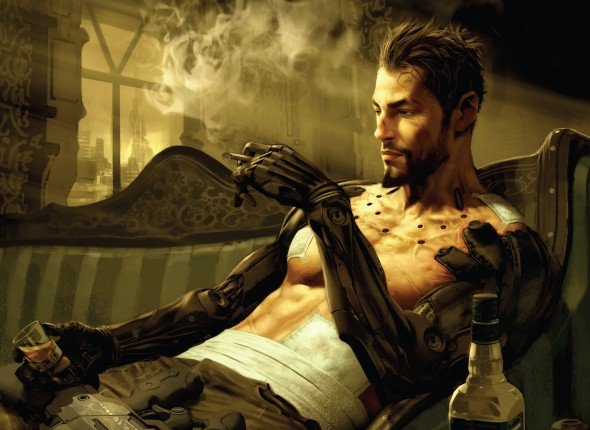Interview: writing Deus Ex: Human Revolution
PCG: It's interesting that you pick up on that, because one of the things that surprised me watching the demonstration was that the guy failed the conversation. And I know Deus Ex had moments like that, where you could fail to get what you wanted, but it's very rare in games for a social path to be closed by you saying the wrong thing. Even in BioWare games, you get a good ending and a bad ending, but it's not a dead end. So is that a conscious focus for the game?
DeMerle: Well, certainly in the conversation gameplay. So we have different types of conversations in the game. The one we were showing you there was the conversation gameplay, which has that gameplay component about it. So yes, it was very much a decision that you could fail the conversations. I actually would like to see a lot more of that kind of thing, because I feel that it was such a strong moment for me in Deus Ex to know that my path got closed because of my decision.
I actually don't like it in a lot of roleplaying games where you get these choices and then it's like, "Okay well, I followed that path. Let's go back and do the other thing," and then you get all the information. To me, that's fake: it's not what a real dialogue is like. And so I like moments in the writing of our story where we can do that. Where we can say, "You've got to choose this or this."
PCG: In Mass Effect 2, at one point you're given the option to tell Cerberus, "Screw you guys, I don't wanna work with you." But you can't actually change-
DeMerle: Yeah, exactly, because you still keep working for them.
PCG: They say, "Well, you have to." It's like, "Oh, okay."
DeMerle: Yeah exactly. I mean, obviously you have to limit it in the game, because you can't have too many branches, so we do limit it in our game. We have the thing where there are certain dialogues that you can play again and again because they give you certain information, but then there are the other ones - and to me, the other ones are the more fun.
Keep up to date with the most important stories and the best deals, as picked by the PC Gamer team.
PCG: During the conversation the player lost, the options on-screen at each stage were Insist, Advise or Pinpoint - are those always the same?
DeMerle: Yeah, well, in the conversation gameplay, the philosophy for these is that you have to convince a person to do something for you, or to help to get to your objective, or whatever. But it depends on the individual that you're dealing with, and their personality, and what they would play to.
So I wouldn't say you're picking emotions - in a lot of games, you're picking, like, "Am I gonna be tough? Am I gonna be nice?" - it's not that kind of thing. It's more of a psychological gameplay based on the individual character you're dealing with. So maybe this is a character who will respond to being humiliated, but this character isn't, so with that character that's not a choice.
So it's more about the psychological aspects of it. And then hopefully, if we've done it well – and so far we've had really good reactions to it – you can tell instantly from the behaviour of the character whether that's succeeded or not.
PCG: So are the actual options you have during the 'conversation games' different depending on who you're talking to?
DeMerle: Yes, they change per person.
PCG: I take it there's no visual representation of their attitude towards you? Like, in Oblivion, you have Disposition, which you have to get to 100...
DeMerle: Well, you know, as we said: the game is about augmentations. So there's a particular augment that you can get that will help you get more hints on that.
PCG: Was there anything about JC Denton as a protagonist that you wanted to capture with Adam? That you liked about the way that guy worked?
DeMerle: Good question. I mean, we are dealing with that universe, so we wanted to maintain some things. I mean, visually, you can obviously see we went with the glasses and the trenchcoat. And we captured - we hope - that same kind of gruff character voice. Though Adam is a different character. I mean, maybe there are similarities between the two; maybe those similarities are intentional for some reason; maybe not. But he is a distinct character of his own.

PCG: How much of that character is determined by the game, and how much do you get to make up?
DeMerle: That's a very good question. I think when you're writing a story for a game and when you're dealing with a hero character, you have that conundrum. That's a debate in the industry that goes on: do you give a character a personality, or do you let the player do it? I think the philosophy we took - which I think is the right one, but, you know, we'll see – you're playing a player fantasy, so you want to embody a personality.
And that's why we developed an Adam Jensen who has a rich back story and has things that happened to him. But that's the past, and as a player you are becoming that person, and once you become that person you're the one who's deciding how he will develop and evolve.
I always laugh about the time when we played some of our first demos. I know who Adam Jensen is, okay, he's my Adam Jensen. And then I'm playing him, and then I thought, okay, I'm sneaking up on these guys, and I wanna see what that lethal takedown is like. And I did it, and I was like, "OH MY GOD!"
PCG: "Adam! How could you?"
DeMerle: Exactly! That was the reaction I had. I was like, "Oh my God, that was so violent! My Adam Jensen can't be that violent." But it was a really key moment to me, because I realised he can be that violent, and that other people might make him that violent.
So the personality can adapt and change. And in developing him as a character, that was one of the first challenges I had. The way that I do it is I always define a character by three or four key personality traits, and hopefully you come up with some that are in conflict with each other, because that's really interesting.
And then I sit there and say, "Okay, that's the trait. How does it manifest itself?" So, for instance, if a character is a very curious person, he might be the kind who's always in your face. But he might be the kind who sits at the back of the bus and just watches people.
So I defined an outline, and I presented it to the team, and I said, "Okay, so this is Adam Jensen, and here's his traits, and here's how they manifest." And it was really cool, because you're in a room with, like, 30 people, and you know they're all different, but every single one of them was like, "Wow, that's me, and yet better – I mean, I'm not quite the superhero yet." So I hope that we succeeded in creating a character who feels very alive and can be embodied and take on the traits of others.
PCG: What were the three or four traits?
DeMerle: Oh, I can't tell you. First of all because I can't quite remember, they've become so part of it. But all of that comes out in playing it.

